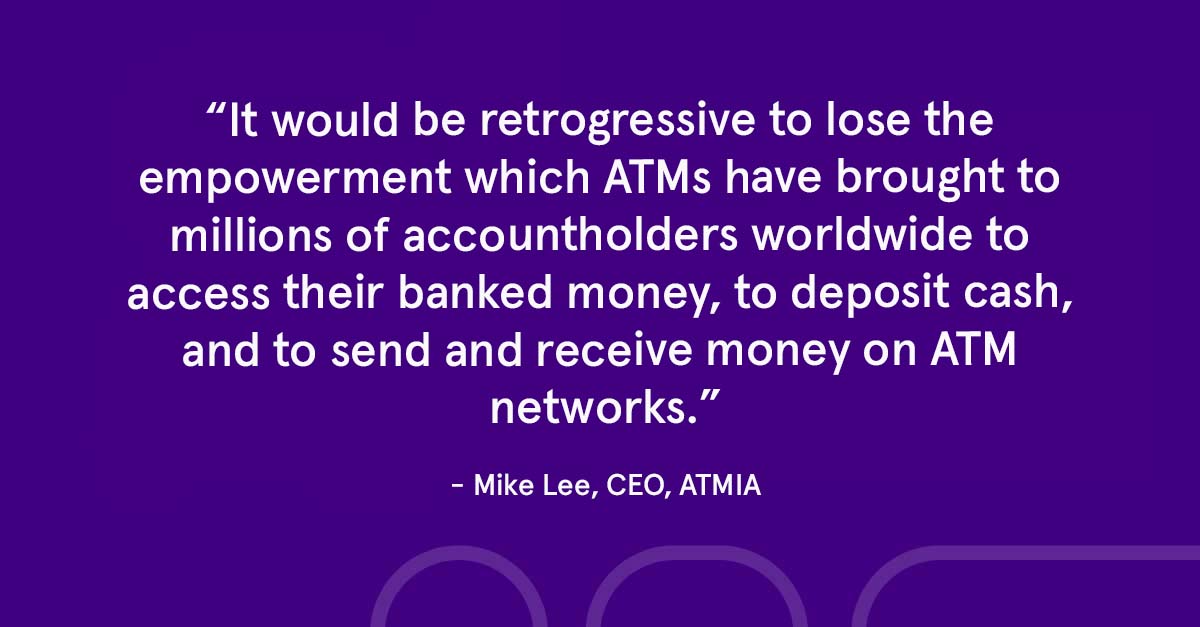ATMs are a vital part of our business as we work to support multiple payment methods, ensuring financial freedom and choice, of which cash is a vital part. There can be no doubt, however, that the landscape of the ATMs industry is drastically changing. As discussed in our previous blog post on cash deserts and the cost of living crisis, the absence of easy access to cash across the UK is creating difficulties for vulnerable communities, prompting government intervention. It has become increasingly unsustainable for ATMs providers and banks to offer widespread ATM access, and, in order for ATMs businesses to remain profitable, it is clear they will need to look to solutions such as BIN Sponsorship and working collaboratively to reduce costs.
Ahead of our attendance at the upcoming ATMIA conference in Berlin this October, we interviewed the outgoing CEO of ATMIA, Mike Lee, about how the ATM industry has changed and evolved over his long career heading up the organisation and how it may change in the future. Here’s what he had to say:
How has the industry changed in your time as the head of ATMIA?
"It has matured a lot. When I first joined, there was underlying tension between the bank ATM deployers and the rising force of the independent ATM deployers. ATMIA acted as a peacemaker between these factions. Today, there is a huge amount of ATM outsourcing, and there is a mutual respect that wasn’t there at the turn of the century. A good relationship has also been built up between key industry stakeholders and regulators. Part of this significant maturation of the industry has been improvements in ATM security and collaboration between the industry and law enforcement to combat organised criminals and fraudsters. Not only are there better security solutions than ever before, but we now have the industry’s first global ATM crime database called the Crisis and Crime Management Intelligence System (CCMIS). Finally, the ATM itself has started to reinvent itself, virtually coinciding at the time of the 50th anniversary of the world’s first ATM in 1967. The standard, vendor-agnostic APIs of Next Gen ATMs, the increasing use of mobile phones to transact at ATMs, the growth of enabling technologies like NFC, and the spread of standards like XFS4IoT are all part of this wave of innovation connected to the reinvention of the ATM."
What have been the greatest challenges to the industry during this time?
"The ATM industry was impacted by the global credit crisis of 2008-9 and the subsequent Great Recession, as well as by the coronavirus pandemic of 2020-2022, but each time the industry rallied and bounced back due to the inherent resilience of the technology, the operators and the ongoing strong global demand for cash by humanity."
What are the most meaningful innovations you’ve seen in this time?
"Enabling platforms like XFS and now XFS4IoT, as well as the new platform of the Next Gen API App model for ATMs with its vendor-agnostic standard interfaces. The switch from using mobile phone banking apps instead of plastic cards to transact at ATMs is very liberating for consumers. I should mention the growth of cash deposits at ATMs which lowers the costs of cash and increases the flow of cash. The spread of deposit-taking ATMs and ATM cash recyclers must and will continue. We at ATMIA advocate the adoption of Universal Cash Deposits at ATMs. Lastly, the ATM industry has become far more innovative than it was even ten years ago – this trend will continue."
"Cash is often seen as crucial to serving vulnerable people and communities – do banks and financial companies have now just responsibilities for ATM provision, or is there still a self-interest opportunity?"
"Cash is used by many demographic groups and a wide range of users, as well as in major economies like Germany and Italy, in addition to emerging economies, and is vital to the balance of money in all societies between private and public interests. While cash is public money, the ATM is not a public utility. ATM estates must be run along business lines for maximum efficiency, and operators are entitled to make money, just like any other business in the private sector. In an era of large-scale closure of bank branches, it is critical for ATMs to be financial self-service hubs providing access to cash and value-added services. It would be retrogressive to lose the empowerment which ATMs have brought to millions of accountholders worldwide to access their banked money, to deposit cash, and to send and receive money on ATM networks."
The UK’s new Financial Services and Markets Bill introduces legislation to secure access to ATMs and minimise the impact of cash deserts. Do you see it as a governmental responsibility to ensure access to cash, or should this be industry-led?
"It should be both. Since cash is minted and governed by central banks in most countries, it is important that these authorities do not allow self-interested groups to undermine the monetary balance by trying artificially to suppress cash use in order to drive up the use of their products, allowing their citizens freedom of choice, including payment choice. It would be very damaging to democracy to diminish payment choices for citizens, including the right to choose cash. At the same time, there is the onus on the ATM and cash industries to keep innovating to lower the costs of cash, thus keeping it competitive for years to come."
What do the next generation of ATMs look like, how will they function?
"A Next Gen ATM is an API App ATM. The ultimate aim is to allow consumers to transact interoperably and seamlessly at ATMs using their mobile phone apps – to make this possible you need agreed-upon industry standard APIs."
If you could pass on only one piece of wisdom to ATM professionals starting today, what would it be?
"Believe in your product as vital to societies right across the world and feed the ecosystem that feeds you."

